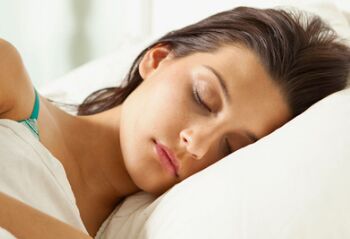晚上睡不好?这10点危害你一定要知道!
|
Your brain doesn't work as well 脑子变得不好使 According to the CDC, insufficient sleep is a public health problem, with more than a third of adults in the U.S. getting less than the recommended seven to eight hours per night. When you don't get adequate sleep—whether due to a chronic issue like sleep apnea, lifestyle reasons like long work hours or raising young children, or bad habits like bingeing on Facebook before bed—it takes a toll on your brain's ability to function. "MRI imaging shows lack of sleep reduces blood flow to areas of the brain that control higher level thought processes," says Richard Shane, PhD, a behavioral sleep specialist. " It impairs your problem-solving abilities, slows your cognitive speed, and decreases constructive thinking skills and logical reasoning." You become forgetful 变得健忘 Another effect of sleep deprivation is an inability to retain memories. "Insufficient sleep interferes with your ability to focus and learn efficiently, which is essential for you to remember something," Dr. Shane says. "Research shows that sleep strengthens nerve connections involved in memory, and also helps consolidate new information into memories. Insufficient sleep interferes with this." Michael J. Breus, PhD, a clinical psychologist known as "The Sleep Doctor," explains that you need enough REM (rapid eye movement) sleep in order for your brain to solidify memories. " You get irritable 你会变得暴躁易怒 You've probably noticed that you wake up "on the wrong side of the bed" if you haven't gotten enough shut-eye. "Sleep deprivation affects mood," Breus says. "It makes you see everything in a more negative light because your emotions are far more volatile when sleep deprived." Although it's not known exactly why this is, Shane says it's another way your brain doesn't function well without sleep. "The area of your brain [frontal lobe] that's in charge of thinking, reasoning, and logic usually balances the area of your brain [amygdala] involved with emotions such as fear, anxiety, aggression, and arousal," he says. "MRI brain scans on people who have not had enough sleep show a decrease in connection between these brain centers, which increases reactivity, fear, and anger." If you keep waking up in the middle night , your brain could be in big trouble. You're more likely to be depressed 你很容易感到沮丧 Another mood disorder linked to lack of sleep is depression. "While the specific brain mechanisms are not known, in one major study people with chronic insomnia were ten times likely to develop depreesion," Dr. Shane says. Sleep apnea, a breathing issue while sleeping, is also linked with depression—one study showed that people who were depressed were five times as likely to have the condition. You make bad judgments 做出糟糕的决定 Along with fuzzy brain function comes impaired decision making. "Sleep has been shown to increase risk-taking behavior," says Clete Kushida, MD, medical director of the Stanford Sleep Medicine Center. In a study of pediatric residents on 24-hour shifts, the doctors made riskier medical decisions if they hadn't gotten at least an hour nap. But even if your job seems to have less potential for disaster, your performance at work may still suffer because of poor problem solving, higher risk-taking, and poor management style without sleep, says Breus. Your heart could suffer 心脏会不好 You may think the only effect of sleep deprivation on your body is that you're really, really tired. But what happens when you don't get enough sleep is that every system in your body is affected, potentially causing long-term effects on your cardiovascular health, including your risk for high blood pressure, heart attack, and stroke. Your skin looks haggard 皮肤黯淡憔悴 Turns out, "beauty sleep" is a real thing, studies show. "Sleep plays an important role in the regeneration of cells and has effects on inflammation in the body, which is important for healing and in some skin problems," says. Dr. Shah. "Skin is also an important organ which helps regulate body temperature during sleep. So, darkening below the eyes, dull skin, or puffy eyes can be a visible symptoms of lack of sleep." Research has even shown that people who need more sleep are considered less attractive. Dr. Shah says two specific hormones that regulate eating behavior are affected. "Ghrelin, which increases appetite, is high in people with sleep deprivation," he says. "On other hand, levels of leptin, which lowers appetite, has been found to be low in sleep-deprived people." One study showed those who were sleep deprived consumed 300 more calories a day than those who were well-rested. You also may gain weight because your metabolism slows down in order to conserve energy when you're tired. You have no energy for exercise 无力锻炼 Skimping on sleep will almost definitely lead to less motivation for working out. "You're going to exercise less if you're constantly tired," Dr. Bazil says. And if you do exercise, your athletic performance may suffer due to a slower reaction time and less energy, as a study of college basketball players showed. Sleepiness leads to more sleepiness 失眠加重 There's a myth you can "get used to" sleeping less—in fact, functioning on a short amount of sleep is almost a badge of honor. But Dr. Bazil says this is "absolutely not" the case. " On the contrary, there is considerable evidence that 'sleep debt' accumulates with continued sleep deprivation, resulting in further deterioration in alertness, concentration, and memory function," he says. This sleep debt just makes you feel sleepier and sleepier during the day, and can persist even after a night of "catch up" sleep. In order to get better sleep, our experts recommend going to bed and waking up at the same time every day, limiting caffeine and alcohol close to bedtime, exercising earlier in the day, getting 15 minutes of sunlight to set your body clock, dimming the lights in the evening, avoiding screen time before bed, and keeping your bedroom dark and cool. |









